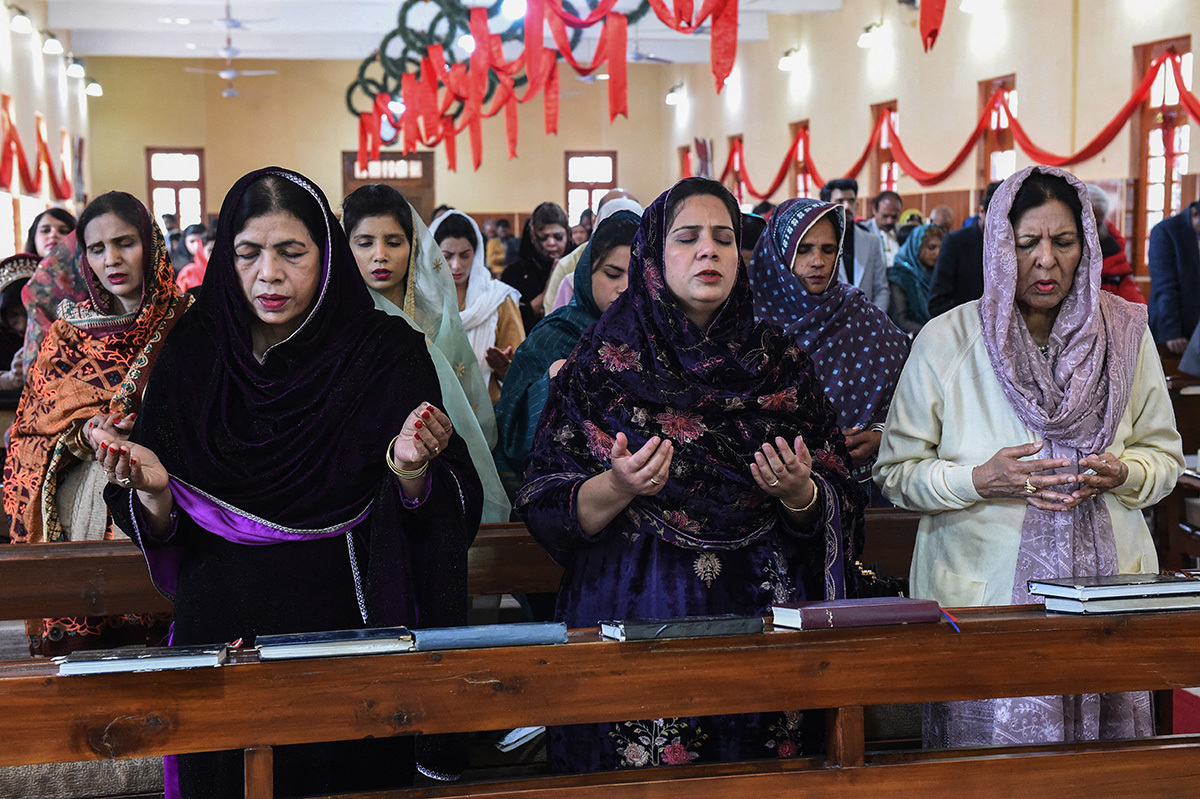Searched: Christian
News
Genesis really is foundational, as every single major Christian doctrine is either grounded directly or indirectly in the history in Genesis.
|
 A California school district has agreed to pay $360,000 to settle with a Christian teacher reportedly fired for refusing to use the preferred pronouns of trans-identified students. A California school district has agreed to pay $360,000 to settle with a Christian teacher reportedly fired for refusing to use the preferred pronouns of trans-identified students. |
American Bible Society study finds majority don't trust technology with spiritual matters.
 Ask ChatGPT how to improve your spiritual life, and the natural-language processing artificial intelligence chatbot has plenty of suggestions.But Americans are skeptical that artificial intelligence, or AI, has much to offer in the way of reliable religious guidance.Sixty-eight percent of people don’t think AI could help them with their spiritual practices or “promote spiritual health,” according to the latest research from American Bible Society (ABS). Fifty-eight percent say they don’t think AI will “aid in moral reasoning” and only one out of every four people say they feel optimistic about the impact the technology will have.“Americans are more fearful than hopeful about artificial intelligence,” said John Farquhar Plake, an ABS program officer and editor-in-chief of the State of the Bible series. “People don’t know how AI will change the culture—but they’re mildly uneasy about it.”ABS surveyed about 2,500 people for its annual report on Scripture engagement and related topics. While technology has been a regular part of the survey, this is the first year ABS dedicated a set of questions to the topic of technology that performs tasks traditionally associated with human intelligence.AI is rapidly evolving, and currently includes everything from Amazon’s “virtual assistant” Alexa to chatbots running large language models that can pass the bar exam. People are pushing the technology further every day, and some Christians who work in tech are excited about the possibilities—dreaming of algorithms that might one day help people grow, learn, and go deeper in their faith.“It is not difficult to imagine how pastors and ...Continue reading... Ask ChatGPT how to improve your spiritual life, and the natural-language processing artificial intelligence chatbot has plenty of suggestions.But Americans are skeptical that artificial intelligence, or AI, has much to offer in the way of reliable religious guidance.Sixty-eight percent of people don’t think AI could help them with their spiritual practices or “promote spiritual health,” according to the latest research from American Bible Society (ABS). Fifty-eight percent say they don’t think AI will “aid in moral reasoning” and only one out of every four people say they feel optimistic about the impact the technology will have.“Americans are more fearful than hopeful about artificial intelligence,” said John Farquhar Plake, an ABS program officer and editor-in-chief of the State of the Bible series. “People don’t know how AI will change the culture—but they’re mildly uneasy about it.”ABS surveyed about 2,500 people for its annual report on Scripture engagement and related topics. While technology has been a regular part of the survey, this is the first year ABS dedicated a set of questions to the topic of technology that performs tasks traditionally associated with human intelligence.AI is rapidly evolving, and currently includes everything from Amazon’s “virtual assistant” Alexa to chatbots running large language models that can pass the bar exam. People are pushing the technology further every day, and some Christians who work in tech are excited about the possibilities—dreaming of algorithms that might one day help people grow, learn, and go deeper in their faith.“It is not difficult to imagine how pastors and ...Continue reading... |
We can humbly seek their wisdom without treating them as mascots for one position or another.
 On September 11, 2020, I found myself under a large tent, where 51 ministers of the Reformed Presbyterian Church had assembled for a COVID-era presbytery. They gathered to receive charges against me, initiating an ecclesiastical trial. I had published a book that affirmed the possibility of theistic evolution—a view regarded by some as dangerous.Through that process, I became personally (and painfully) aware of how heated Genesis 1 controversies continue to be. My trial was ultimately dropped, but I was compelled to resign my pastorate and leave that denomination.I still love the Reformed Presbyterian Church and am grateful for my decades as a student and minister among its people. But I grieve that such passions for certain interpretations of Genesis 1 lead to damaged relationships and truncated ministries. It should not be so.There are already plenty of Genesis 1 studies on offer (including my own, called The Liturgy of Creation). But what the church really needs are more resources to help us engage these discussions more responsibly. Andrew J. Brown’s latest book, Recruiting the Ancients for the Creation Debate, is just such a resource.Brown, an Old Testament lecturer at Melbourne School of Theology, takes no sides on the question of whether the six days of creation are literal or figurative days. Recruiting the Ancients is not an attempt to solve creation controversies. Instead, it surveys what historic church authorities had to say on the subject, arguing that they shouldn’t be enlisted as straightforward allies of this or that contemporary position.The book is based on Brown’s earlier book on the same topic (The Days of Creation: A History of Christian Interpretation of Genesis 1:1–2:3), ...Continue reading... On September 11, 2020, I found myself under a large tent, where 51 ministers of the Reformed Presbyterian Church had assembled for a COVID-era presbytery. They gathered to receive charges against me, initiating an ecclesiastical trial. I had published a book that affirmed the possibility of theistic evolution—a view regarded by some as dangerous.Through that process, I became personally (and painfully) aware of how heated Genesis 1 controversies continue to be. My trial was ultimately dropped, but I was compelled to resign my pastorate and leave that denomination.I still love the Reformed Presbyterian Church and am grateful for my decades as a student and minister among its people. But I grieve that such passions for certain interpretations of Genesis 1 lead to damaged relationships and truncated ministries. It should not be so.There are already plenty of Genesis 1 studies on offer (including my own, called The Liturgy of Creation). But what the church really needs are more resources to help us engage these discussions more responsibly. Andrew J. Brown’s latest book, Recruiting the Ancients for the Creation Debate, is just such a resource.Brown, an Old Testament lecturer at Melbourne School of Theology, takes no sides on the question of whether the six days of creation are literal or figurative days. Recruiting the Ancients is not an attempt to solve creation controversies. Instead, it surveys what historic church authorities had to say on the subject, arguing that they shouldn’t be enlisted as straightforward allies of this or that contemporary position.The book is based on Brown’s earlier book on the same topic (The Days of Creation: A History of Christian Interpretation of Genesis 1:1–2:3), ...Continue reading... |
A federal Justice Department attorney expressed concerns to a Michigan judge about conservative media coverage suggesting that President Joe Biden's administration is persecuting Christians and pro-lifers for their beliefs. The discussion took place during a March pre-trial conference in USA v. Zastrow, in which the federal government brought Freedom of Access to Clinic Entrances (FACE) […]The post Biden Lawyer Tried to Get Judge to Silence Attorney Defending Persecuted Pro-Life Americans appeared first on LifeNews.com.
|
Some sports stars make headlines for drug abuse or acts of violence, but one football player is taking heat for publicly promoting Christian values. On Saturday, Kansas City Chiefs kicker Harrison Butker? delivered? the commencement at the Catholic Benedictine College, encouraging young graduates to stand firm in their faith and live out authentic Christian virtues. Now, the […]The post Here's Harrison Butker's Full Speech Celebrating Pro-Life Christian Values appeared first on LifeNews.com.
|
Genesis really is foundational, as every single major Christian doctrine is either grounded directly or indirectly in the history in Genesis.
|
As a physician, I witness countless first and last breaths. As a Christian, I am constantly reminded of how God breathes life into us through his Spirit.
 The scalpel sliced through the uterine wall. The amniotic sac ruptured, and fluid flowed across the blue surgical drapery toward me. The obstetrician’s fingers curled around the baby’s head while my gloved hands pressed firmly against the mother’s abdomen. The baby was larger than we had expected. I shifted my full body weight against the mother’s belly, and, at last, the newborn’s head slipped through. Her shoulders quickly followed, and there she lay, eyes taking in the bright world for the first time.Before she could cry, she took her first breath. Air rushed in, pushing aside fluid that had filled her lungs from six weeks of gestation. The oxygen diffused through the blood vessels of the alveoli, tiny air sacs within her lungs, relaxing the pulmonary arteries and allowing blood to course through her lungs for the first time. The short vessel connecting her lung arteries and heart began to close. Pressure built in her heart, causing the tiny hole between its chambers to snap shut.She breathed more vigorously than anyone else in the operating room, her purple hue softening to a rich pink. Squinting against the glaring light above, she cried again. What a foreign world this is—where air becomes breath, and then breath returns to air.Ruach is a Hebrew word meaning breath, wind, or spirit. (In the Septuagint, an ancient Greek translation of the Old Testament, it is rendered as pneuma or pneumon, the roots from which we get many English words pertaining to lungs.)In Genesis, ruach is both the Spirit of God bringing light and order into an unordered world (1:1–4) and the breath of life that God breathes into Adam (2:7). Psalm 33:6 says, “By the word of ...Continue reading... The scalpel sliced through the uterine wall. The amniotic sac ruptured, and fluid flowed across the blue surgical drapery toward me. The obstetrician’s fingers curled around the baby’s head while my gloved hands pressed firmly against the mother’s abdomen. The baby was larger than we had expected. I shifted my full body weight against the mother’s belly, and, at last, the newborn’s head slipped through. Her shoulders quickly followed, and there she lay, eyes taking in the bright world for the first time.Before she could cry, she took her first breath. Air rushed in, pushing aside fluid that had filled her lungs from six weeks of gestation. The oxygen diffused through the blood vessels of the alveoli, tiny air sacs within her lungs, relaxing the pulmonary arteries and allowing blood to course through her lungs for the first time. The short vessel connecting her lung arteries and heart began to close. Pressure built in her heart, causing the tiny hole between its chambers to snap shut.She breathed more vigorously than anyone else in the operating room, her purple hue softening to a rich pink. Squinting against the glaring light above, she cried again. What a foreign world this is—where air becomes breath, and then breath returns to air.Ruach is a Hebrew word meaning breath, wind, or spirit. (In the Septuagint, an ancient Greek translation of the Old Testament, it is rendered as pneuma or pneumon, the roots from which we get many English words pertaining to lungs.)In Genesis, ruach is both the Spirit of God bringing light and order into an unordered world (1:1–4) and the breath of life that God breathes into Adam (2:7). Psalm 33:6 says, “By the word of ...Continue reading... |
By calling or circumstance, millions in the “sandwich generation” feel the weight and cost of tending to aging relatives.
 Shanoah Bruner is among the quarter of American adults who find themselves in the “sandwich generation,” raising children under 18 and supporting aging parents.At her home in the Indianapolis suburbs, the 40-something mom lives with her husband, tween and teen daughters, mother-in-law, and biological father.The caretaking role comes naturally to Bruner. She was raised in a family that regularly opened their home to others and served their church and community. Plus, she worked in assisted living, memory care, and skilled nursing for over 20 years.“I grew up in a very Christian home where, you know, people meant more than possessions,” she said. “So that’s just how I look at it, and it’s definitely rewarding for me, though that’s not the case for everybody.”As baby boomers descend into their twilight years, their kids are taking them in or helping manage care from afar. Sixty-six percent of caregivers are women like Bruner, most of them in their mid-to-late 40s, who also work outside the home.The demanding needs of caregivers and their loved ones offer believers a chance to provide support and gospel hope. Churches, nonprofits, and government and parachurch organizations have resources, and individual Christians can provide personal, tangible love in action.In 2022, the first Bible study specifically for dementia caregivers was published. Some churches are implementing caregiver workshops. The Caregiving Support Network hosts a program to “sponsor a caregiver,” and there’s even a dedicated “Caregiver’s Prayer.”Richard Gentzler Jr., an expert in ministry for aging adults, paraphrased former First Lady Rosalynn Carter when he wrote that ...Continue reading... Shanoah Bruner is among the quarter of American adults who find themselves in the “sandwich generation,” raising children under 18 and supporting aging parents.At her home in the Indianapolis suburbs, the 40-something mom lives with her husband, tween and teen daughters, mother-in-law, and biological father.The caretaking role comes naturally to Bruner. She was raised in a family that regularly opened their home to others and served their church and community. Plus, she worked in assisted living, memory care, and skilled nursing for over 20 years.“I grew up in a very Christian home where, you know, people meant more than possessions,” she said. “So that’s just how I look at it, and it’s definitely rewarding for me, though that’s not the case for everybody.”As baby boomers descend into their twilight years, their kids are taking them in or helping manage care from afar. Sixty-six percent of caregivers are women like Bruner, most of them in their mid-to-late 40s, who also work outside the home.The demanding needs of caregivers and their loved ones offer believers a chance to provide support and gospel hope. Churches, nonprofits, and government and parachurch organizations have resources, and individual Christians can provide personal, tangible love in action.In 2022, the first Bible study specifically for dementia caregivers was published. Some churches are implementing caregiver workshops. The Caregiving Support Network hosts a program to “sponsor a caregiver,” and there’s even a dedicated “Caregiver’s Prayer.”Richard Gentzler Jr., an expert in ministry for aging adults, paraphrased former First Lady Rosalynn Carter when he wrote that ...Continue reading... |
Tony Perkins discusses the severity of religious persecution that Christians face in Nigeria and gives an update on Leah Sharibu, who remains in held in captivity by Boko Haram....
|
Schaeffer demonstrated that “charity and clarity” must go together. His deep compassion for people and firm conviction in truth has left an enduring legacy. May we follow his example.? ?
|
 Saima Bibi was serving tea to guests at her quarters in Punjab Province, Pakistan when her Muslim employer dragged her outside and pushed her towards an electric chaff cutter, tearing off her ear and cutting most of her scalp, her husband said. Saima Bibi was serving tea to guests at her quarters in Punjab Province, Pakistan when her Muslim employer dragged her outside and pushed her towards an electric chaff cutter, tearing off her ear and cutting most of her scalp, her husband said. |
ABC's The View was pulsing with anti-Catholic bigotry during Thursday's show, as pretend-moderate co-host Sara Haines lashed out and smeared Chiefs kicker Harrison Butker and his Catholic faith as “extremists” and “cult-like.” His crime? Giving a commencement address at Catholic, Benedictine College where he talked about – among other things – how some women find […]The post The View Host Sara Haines: Harrison Butker’s Pro-Life Christian Views are Like a “Cult” appeared first on LifeNews.com.
|
 Around 100 people professed faith in Jesus at worship services held in wildfire-ravaged Hawaii last week, the culmination of Harvest Christian Fellowship's "Hope for Lahaina"? outreach efforts to share the hope of Christ with a community devastated by the deadliest wildfire in the United States in over a century.? Around 100 people professed faith in Jesus at worship services held in wildfire-ravaged Hawaii last week, the culmination of Harvest Christian Fellowship's "Hope for Lahaina"? outreach efforts to share the hope of Christ with a community devastated by the deadliest wildfire in the United States in over a century.? |
 Events that occurred this week in Christian history include the Prayer Pilgrimage for Freedom, the death of Pope Sylvester II, and the commissioning of missionary Althea Brown. Events that occurred this week in Christian history include the Prayer Pilgrimage for Freedom, the death of Pope Sylvester II, and the commissioning of missionary Althea Brown. |
 Following a rights group report that 1,336 people were killed in Plateau state, Nigeria between December and February, residents reported 18 Christians killed since mid-April. Following a rights group report that 1,336 people were killed in Plateau state, Nigeria between December and February, residents reported 18 Christians killed since mid-April. |
 A Christian organization has accused a Tennessee hotel of unlawfully canceling its pro-Israel conference because the venue received threats over the event. The local police department says the cancelation was purely a "corporate" decision. A Christian organization has accused a Tennessee hotel of unlawfully canceling its pro-Israel conference because the venue received threats over the event. The local police department says the cancelation was purely a "corporate" decision. |
The highlife musician challenged the materialism and extortion he encountered too often in the church.
 Kofi Owusu Dua-Anto, a Ghanaian gospel musician who challenged church leaders with his catchy songs, died last month age 45. Known professionally as KODA, the artist passed away suddenly on April 21 after a yet-undisclosed short illness.KODA won awards for his vocal and musical finesse and production skills, but he used the platform his music offered him to speak out against the materialism and self-promotion he believed had overtaken his country’s church leaders.“What is being preached from the pulpit? If it’s just the aesthetics of Christianity … the flashy things of how the man of God has visited 20 churches in the UK or the US and how he stood in T. D. Jakes’s church … if that’s the vision … then that’s what [Christians will] chase,” he said in 2021.In 2013, KODA put these concerns to music when he released “Nsem Pii” (“Many Issues”).“Fifteen ways to be successful, 13 ways to make much money, but the one way to make to heaven, preacher man, you don’t preach about it,” he sang in both Twi, a Ghanian local language, and English. “Listen, last Sunday I heard you preach; I must confess, I was confused, was that church of GIMPA?” (GIMPA or Ghana Institute of Management and Public Administration, is a prestigious public university in Ghana.)The track surprised many in the local Christian community, one that traditionally practiced unquestioned reverence toward pastors and church leaders, and the gospel music industry, which generally only sang about God and commented little on culture.KODA credited the Bible as his inspiration for his lyrics.“I was reading the Acts of the Apostles from [chapters] 1 to ...Continue reading... Kofi Owusu Dua-Anto, a Ghanaian gospel musician who challenged church leaders with his catchy songs, died last month age 45. Known professionally as KODA, the artist passed away suddenly on April 21 after a yet-undisclosed short illness.KODA won awards for his vocal and musical finesse and production skills, but he used the platform his music offered him to speak out against the materialism and self-promotion he believed had overtaken his country’s church leaders.“What is being preached from the pulpit? If it’s just the aesthetics of Christianity … the flashy things of how the man of God has visited 20 churches in the UK or the US and how he stood in T. D. Jakes’s church … if that’s the vision … then that’s what [Christians will] chase,” he said in 2021.In 2013, KODA put these concerns to music when he released “Nsem Pii” (“Many Issues”).“Fifteen ways to be successful, 13 ways to make much money, but the one way to make to heaven, preacher man, you don’t preach about it,” he sang in both Twi, a Ghanian local language, and English. “Listen, last Sunday I heard you preach; I must confess, I was confused, was that church of GIMPA?” (GIMPA or Ghana Institute of Management and Public Administration, is a prestigious public university in Ghana.)The track surprised many in the local Christian community, one that traditionally practiced unquestioned reverence toward pastors and church leaders, and the gospel music industry, which generally only sang about God and commented little on culture.KODA credited the Bible as his inspiration for his lyrics.“I was reading the Acts of the Apostles from [chapters] 1 to ...Continue reading... |
Get the most recent headlines and stories from Christianity Today delivered to your inbox daily.
|
For all his greatness, we should most seek to imitate the late pastor's humility and indifference to fame.
 In spring of last year, many of us saw a photo of the late Timothy Keller sitting on a park bench. The photo was used on the cover of Collin Hansen’s biography of Keller, and it circulated around the internet in May when he passed away—on social media, blogs, and even Keller’s personal website.What most of us didn’t see, however, was the banana peel lying on the bench only a couple feet from Keller. The peel has been cropped from most versions of the photo, and understandably so. Who wants to see an ugly brown bit of organic waste in an author’s photograph?I confess that if I were a world-famous pastor and best-selling author having my picture taken by a professional photographer, I would most certainly have moved the banana peel before someone took my picture. Who wouldn’t? But Keller didn’t seem to care.I believe this points to a deeper character trait of Keller’s, which many observed during his lifetime of ministry: an indifference to fame and to curating an image—something many of us struggle with in the social media era. This is also part of why, I believe, he finished his race so well.Finishing well in life and ministry has been historically difficult for believers, especially for those in positions of leadership. Think of Gideon or Solomon in the Old Testament, Demas in the New Testament, or, of course, the many church leaders today who have infamously failed to persevere.The esteem that leaders receive from the Christian community can allow for hidden flaws to grow like rust on the hull of a ship, unnoticed and unaddressed at first. But as these leaders reach greater influence, greater weight is placed on these flaws—which can reach ...Continue reading... In spring of last year, many of us saw a photo of the late Timothy Keller sitting on a park bench. The photo was used on the cover of Collin Hansen’s biography of Keller, and it circulated around the internet in May when he passed away—on social media, blogs, and even Keller’s personal website.What most of us didn’t see, however, was the banana peel lying on the bench only a couple feet from Keller. The peel has been cropped from most versions of the photo, and understandably so. Who wants to see an ugly brown bit of organic waste in an author’s photograph?I confess that if I were a world-famous pastor and best-selling author having my picture taken by a professional photographer, I would most certainly have moved the banana peel before someone took my picture. Who wouldn’t? But Keller didn’t seem to care.I believe this points to a deeper character trait of Keller’s, which many observed during his lifetime of ministry: an indifference to fame and to curating an image—something many of us struggle with in the social media era. This is also part of why, I believe, he finished his race so well.Finishing well in life and ministry has been historically difficult for believers, especially for those in positions of leadership. Think of Gideon or Solomon in the Old Testament, Demas in the New Testament, or, of course, the many church leaders today who have infamously failed to persevere.The esteem that leaders receive from the Christian community can allow for hidden flaws to grow like rust on the hull of a ship, unnoticed and unaddressed at first. But as these leaders reach greater influence, greater weight is placed on these flaws—which can reach ...Continue reading... |
The wager only scratches the surface of his relevance to a post-Christian era.
 It is a common lament that we live in a post-Christian era. This fact raises challenges to our witness to the world. Most of our audience thinks that, in G. K. Chesterton’s words, Christianity has been tried and found wanting (rather than found wanting and left untried). It is not considered a live option. How do we bear witness well in this cultural context? We might do well to reconsider one of the most enigmatic thinkers in Christian history, Blaise Pascal.Pascal suffers from a public relations problem. As the source of Pascal’s wager, he is often considered a gambling man. He urges the non-believer to bet that God exists. What does one have to lose? In Beyond the Wager: The Christian Brilliance of Blaise Pascal, philosopher Douglas Groothuis shows that there is more to Pascal’s life and thought than his most famous argument. Groothuis demonstrates that we have much to learn from this brilliant thinker. Pascal, he argues, is a crucial thinker for our time.Essential writingsPascal came on the scene in the 17th century, during the early years of the Scientific Revolution. Several of his works contributed to this movement, including treatises on the geometry of conic sections, theories of probability, and conclusions to extensive experiments he had done to test the possibility of a vacuum. He invented the first functional calculator, which he had built to help his father with his work of assessing taxes.His best-known works, however, focus on Christianity. In the Provincial Letters, Pascal defends the Jansenist movement, which was condemned by the Catholic church, against the Jesuits. The Jansenists emphasized that the depth of human sinfulness required a work of God for our salvation. The Christian life ...Continue reading... It is a common lament that we live in a post-Christian era. This fact raises challenges to our witness to the world. Most of our audience thinks that, in G. K. Chesterton’s words, Christianity has been tried and found wanting (rather than found wanting and left untried). It is not considered a live option. How do we bear witness well in this cultural context? We might do well to reconsider one of the most enigmatic thinkers in Christian history, Blaise Pascal.Pascal suffers from a public relations problem. As the source of Pascal’s wager, he is often considered a gambling man. He urges the non-believer to bet that God exists. What does one have to lose? In Beyond the Wager: The Christian Brilliance of Blaise Pascal, philosopher Douglas Groothuis shows that there is more to Pascal’s life and thought than his most famous argument. Groothuis demonstrates that we have much to learn from this brilliant thinker. Pascal, he argues, is a crucial thinker for our time.Essential writingsPascal came on the scene in the 17th century, during the early years of the Scientific Revolution. Several of his works contributed to this movement, including treatises on the geometry of conic sections, theories of probability, and conclusions to extensive experiments he had done to test the possibility of a vacuum. He invented the first functional calculator, which he had built to help his father with his work of assessing taxes.His best-known works, however, focus on Christianity. In the Provincial Letters, Pascal defends the Jansenist movement, which was condemned by the Catholic church, against the Jesuits. The Jansenists emphasized that the depth of human sinfulness required a work of God for our salvation. The Christian life ...Continue reading... |
For seven seasons, the show has offered a clichéd (and nostalgic) vision of how atheists and believers relate to each other.
 My mom was the one who told me to watch The Big Bang Theory. It was a show about nerds—and I was a nerd. She thought I’d enjoy it. A friend had already mentioned that the main character, Sheldon Cooper, was “exactly like” me. After I watched the show, at Mom’s encouragement, I joked that I had mixed feelings about the comparison.The Big Bang Theory was extremely popular and not just with my mom; at its height, it averaged 20 million viewers a night. But it never really resonated with actual dweebs. Its audience was largely Gen X women—not people who were Sheldon but people who “knew a Sheldon,” not the geeks themselves but their mothers and friends.It’s fitting, then, that the even-more-popular Big Bang spinoff would be Young Sheldon, a prequel about the title character’s childhood in East Texas—and that Sheldon’s relationship with his mom, Mary, would be at the heart of the show. Young Sheldon sits at the top of the prime-time rankings; one recent week, the show (which streams on Netflix, Max, and Paramount+) topped all streamed content across US household televisions.As Young Sheldon comes to an end (its series finale airs May 16; a spinoff starring two breakout characters—Georgie and Mandy—has already been announced), so too does the onscreen dynamic between Sheldon and Mary. So too does a nostalgic vision for how the “science vs. religion” debate plays out in our families.Mary is Sheldon’s opposite in nearly every way. He’s a logical atheist physicist with no people skills; Mary is a warm, folksy conservative Christian. In many ways, she serves as an audience surrogate. (For what it’s worth, Mary was my ...Continue reading... My mom was the one who told me to watch The Big Bang Theory. It was a show about nerds—and I was a nerd. She thought I’d enjoy it. A friend had already mentioned that the main character, Sheldon Cooper, was “exactly like” me. After I watched the show, at Mom’s encouragement, I joked that I had mixed feelings about the comparison.The Big Bang Theory was extremely popular and not just with my mom; at its height, it averaged 20 million viewers a night. But it never really resonated with actual dweebs. Its audience was largely Gen X women—not people who were Sheldon but people who “knew a Sheldon,” not the geeks themselves but their mothers and friends.It’s fitting, then, that the even-more-popular Big Bang spinoff would be Young Sheldon, a prequel about the title character’s childhood in East Texas—and that Sheldon’s relationship with his mom, Mary, would be at the heart of the show. Young Sheldon sits at the top of the prime-time rankings; one recent week, the show (which streams on Netflix, Max, and Paramount+) topped all streamed content across US household televisions.As Young Sheldon comes to an end (its series finale airs May 16; a spinoff starring two breakout characters—Georgie and Mandy—has already been announced), so too does the onscreen dynamic between Sheldon and Mary. So too does a nostalgic vision for how the “science vs. religion” debate plays out in our families.Mary is Sheldon’s opposite in nearly every way. He’s a logical atheist physicist with no people skills; Mary is a warm, folksy conservative Christian. In many ways, she serves as an audience surrogate. (For what it’s worth, Mary was my ...Continue reading... |
The Sonesta Nashville Hotel could be facing a federal lawsuit after they abruptly canceled reservations for an upcoming Christian conference. […]
|
The Sonesta Nashville Airport Hotel cancelled a pro-Israel event sponsored by a Christian ministry due to security threats. We will […]
|
Māori Christians in New Zealand bristle at newly translated portions of the Bible that use the names of local deities.
 Last year, Bible Society New Zealand (BSNZ) released a 109-page booklet with 10 Bible passages published in a contemporary Māori translation for the first time. The version used the names of atua Māori, or Māori gods and deities, in place of words like heaven, earth, land, and sea. Genesis 1:1, for example, says that in the beginning, God made Rangi-nui (Sky Father) and Papatūānuku (Earth Mother) instead of rangi and whenua respectively.The changes, meant to appeal to younger Māori, stirred debate. While some readers praised the changes (“The terms are more relatable,” wrote one respondent in a BSNZ survey), many, including Māori theologians and church leaders, decried the use of atua Māori in the Scriptures as “twisted” and “blasphemous.”The aim of publishing He Tīmatanga (A Beginning) was not to present a final translation but to offer a draft for feedback, said Clare Knowles, translation coordinator at BSNZ. Publishing these passages was part of an effort that began in 2008 to “retranslate the entire Bible into Māori [in] today’s language.”While Māori speakers in New Zealand have a Bible translation in their language, it was last revised in 1952. The most recent edition in 2012 mainly focused on reformatting the text with updated paragraphs, spelling, and punctuation, but the content has largely remained the same since missionaries first translated the Bible into Māori in the 19th century.“Imagine if the only English translation we had was the King James Version. … This is a bit like the situation with Te Paipera Tapu, the Māori Bible,” Knowles wrote in an article promoting He Tīmatanga.In New Zealand, about 8 percent of the population speak Māori, ...Continue reading... Last year, Bible Society New Zealand (BSNZ) released a 109-page booklet with 10 Bible passages published in a contemporary Māori translation for the first time. The version used the names of atua Māori, or Māori gods and deities, in place of words like heaven, earth, land, and sea. Genesis 1:1, for example, says that in the beginning, God made Rangi-nui (Sky Father) and Papatūānuku (Earth Mother) instead of rangi and whenua respectively.The changes, meant to appeal to younger Māori, stirred debate. While some readers praised the changes (“The terms are more relatable,” wrote one respondent in a BSNZ survey), many, including Māori theologians and church leaders, decried the use of atua Māori in the Scriptures as “twisted” and “blasphemous.”The aim of publishing He Tīmatanga (A Beginning) was not to present a final translation but to offer a draft for feedback, said Clare Knowles, translation coordinator at BSNZ. Publishing these passages was part of an effort that began in 2008 to “retranslate the entire Bible into Māori [in] today’s language.”While Māori speakers in New Zealand have a Bible translation in their language, it was last revised in 1952. The most recent edition in 2012 mainly focused on reformatting the text with updated paragraphs, spelling, and punctuation, but the content has largely remained the same since missionaries first translated the Bible into Māori in the 19th century.“Imagine if the only English translation we had was the King James Version. … This is a bit like the situation with Te Paipera Tapu, the Māori Bible,” Knowles wrote in an article promoting He Tīmatanga.In New Zealand, about 8 percent of the population speak Māori, ...Continue reading... |



 Links
Links  Articles
Articles  Blogs
Blogs  Videos
Videos  News
News  Colors
Colors 

 New links
New links

